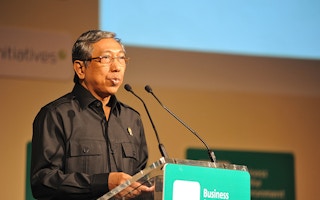Finding solutions that will transform the planet was the goal outlined at the opening of the two-day Business for the Environment Global Summit in Jakarta, where hundreds of delegates from around the world gathered to share ideas on how corporate goals can align with environmental preservation.
Indonesia’s Environment Minister Muhammad Hatta called the forum “essential to energizing economic growth to save the planet,” while the head of the Indonesian Chamber of Commerce, Suryo Sulisto, said the country was the ideal venue for the summit because it stood to be a major beneficiary of the solutions slated for discussion.
Indonesia, like other developing countries, suffers greatly from the effects of climate change – flash floods and landslides, forest fires and damaged crops and agricultural shortages due to extreme weather. It is also the world’s third-largest greenhouse gas emitter.
During the summit, business leaders will meet to share ideas and discuss models that can be used to transform “business as usual.”
WWF said it would be hosting a field trip to Central Kalimantan to learn how the region has restored peatland in its national park in a way that has prevented more than 1 million tonnes of carbon from being emitted in a 50,000-hectare plot.
The World Bank’s special envoy for climate change, Andrew Steer, referred to several projects that the bank is supporting, such as cap-and-trade systems in China and a $100-million grant facility to help 20 middle-income countries, including Indonesia, introduce market-based mechanisms. Cap-and-trade is a form of carbon trading used to control pollution by providing economic incentives for reducing the emissions of pollutants such as carbon dioxide (CO2).
“Ten years ago, less than 10 per cent of the 155 client countries in the World Bank were asking for help with climate change,” Steer said. “Now, almost 90 per cent have said please help us with climate change.”
Money is essential to the issue, he explained. As delegates in Jakarta talk about how businesses can support conservation, government representatives from 40 rich-world countries are gathering at the United Nations Green Climate Fund summit in Mexico City to discuss the creation of a $100 billion fund to help developing countries curb greenhouse gas emissions by switching to renewable energy.
Indonesia has seen rapid development over the past decade, but poverty and environmental degradation have worsened with globalization, Hatta noted. Rather than separate the development from conservation, there needs to be an understanding that rising pollution and CO2 levels pose challenges to both ecosystems and economies.
“Climate change has the potential to unwind years of development,” Hatta continued, noting that what is needed is significant investment in sustainable development combined with a shift in people’s consumption and lifestyle habits.
Indonesia is putting the goal of achieving a green economy into its long-term development plan for 2025. That means promoting more resource efficiency, pushing for policy reforms at the local level that will improve oversight of businesses operating in fragile ecosystems and building the capacity of local players through partnerships and networking.
Officials here say they’re not willing to trade conservation for economic growth. The real theme is 26/7, said Hatta, referring to Indonesia’s commitment to cutting its greenhouse gas emissions by 26 percent by 2020, while also achieving seven percent economic growth.
That will require a huge financial commitment from both the government and the private sector, and would put Indonesia at the forefront of environmental innovation. But analysts and delegates alike wonder whether Indonesia is capable of meeting these objectives.
“The world is watching Indonesia,” said Steer. “If it succeeds, many other countries will follow. If Indonesia fails, all bets are off.”
Eco-Business.com’s coverage of the B4E Global Summit 2011 is brought to you by City Developments Ltd (CDL).






















